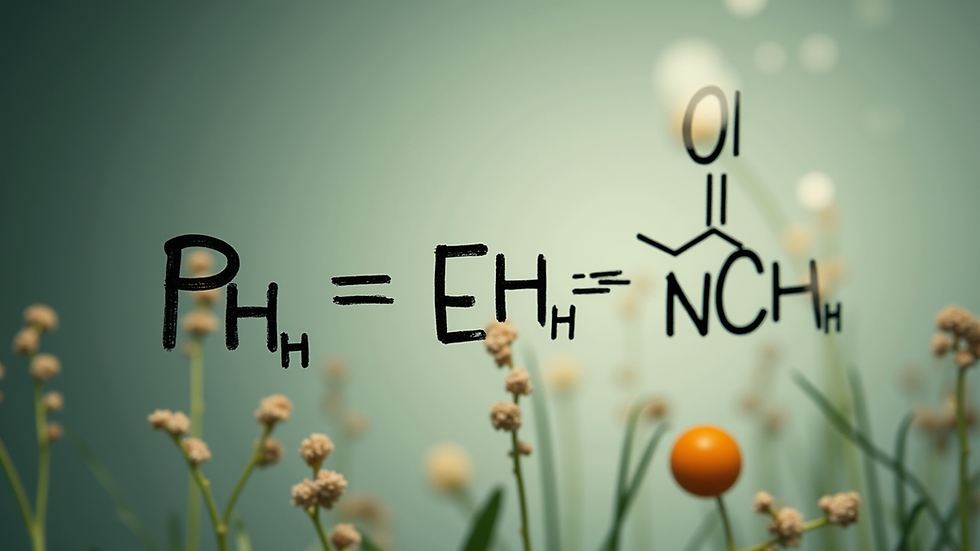Understanding Pyroles and Pyroluria: The Link Between Gut Health and Nutrient Deficiency
- Rahni Buchanan
- Sep 30, 2025
- 4 min read
In recent years, conversations about gut health have gained significant traction. More people are realizing how gut health affects overall well-being. One key area of interest is the relationship between gut inflammation, increased permeability (often referred to as "leaky gut"), and the production of pyroles. This blog post will explore pyroles and pyroluria, their connection to nutrient deficiencies, and how they relate to gut health.
What Are Pyroles?
Pyroles are byproducts of hemoglobin synthesis that can be produced in excess when the body is under stress or when it lacks certain nutrients. When pyroles are excreted, they bind to essential minerals, including zinc, magnesium, manganese, and vitamin B6. This binding can lead to deficiencies in these vital nutrients, impacting immune response, mood regulation, and cognitive functions.
Studies show that up to 10% of the population might have pyroluria, a condition characterized by elevated levels of pyroles in urine. People with this condition often experience a range of symptoms such as anxiety, depression, fatigue, and trouble concentrating. Understanding how pyroles are produced can be vital for addressing these symptoms effectively.
The Role of Gut Health in Pyrole Production
Gut health significantly influences pyrole production. When the gut is inflamed, as seen in conditions like leaky gut syndrome, the body produces a protein called zonulin. Zonulin increases intestinal permeability, allowing larger molecules to pass through the gut lining into the bloodstream, triggering an immune response and further inflammation.
Research indicates that 70% of the immune system resides in the gut. Therefore, when inflammation increases, the body may produce more pyroles, leading to more nutrient deficiencies. This cycle can be challenging for individuals as they may experience symptoms related to both gut health and nutrient deficiencies simultaneously.
The Connection Between Gluten and Pyrole Production
Recent studies suggest a link between gluten ingestion and pyrole production. Gluten, a protein found in wheat and other grains, can cause gut inflammation in sensitive individuals, especially those with celiac disease or non-celiac gluten sensitivity. When gluten is consumed, it can provoke an immune response that increases zonulin production and, in turn, heightens intestinal permeability.
For example, research has identified that about 1 in 100 people has celiac disease, and many more experience non-celiac gluten sensitivity. As the gut becomes more permeable, the chance of pyrole production rises. This highlights the importance of monitoring gluten intake, especially for those experiencing symptoms related to pyroluria. Reducing gluten consumption may help reduce gut inflammation and, consequently, decrease pyrole production.
Nutrient Deficiencies Associated with Pyroluria
The binding of pyroles to essential nutrients can lead to significant deficiencies. Here are some key nutrients affected by pyrole production:
Zinc
Zinc is crucial for immune function, wound healing, and DNA synthesis. A deficiency in zinc may lead to symptoms such as weakened immunity, hair loss, and skin issues. Individuals with pyroluria often struggle to maintain adequate zinc levels because of pyrole binding. Research indicates that up to 20% of the population may be zinc deficient.
Magnesium
Magnesium is vital for over 300 biochemical reactions in the body, including energy production and muscle function. A magnesium deficiency can result in symptoms like muscle cramps, fatigue, and anxiety. Loss of magnesium due to pyrole binding can worsen these issues.
Manganese
Manganese is essential for bone health, metabolism, and antioxidant defense. A deficiency can lead to impaired growth, reproductive issues, and neurological problems. Individuals with pyroluria are at risk of manganese deficiency due to the binding of pyroles.
Vitamin B6
Vitamin B6 is involved in neurotransmitter synthesis and is crucial for mood regulation. A deficiency can lead to symptoms such as irritability, depression, and cognitive decline. The binding of pyroles to vitamin B6 can significantly impact mental health, further complicating the individual's condition.
Diagram of Pyrole Production

Strategies for Managing Pyroluria and Nutrient Deficiencies
For individuals experiencing symptoms associated with pyroluria, improving gut health and addressing nutrient deficiencies is crucial. Here are some strategies to consider:
Improve Gut Health
Focusing on gut health can help reduce inflammation and improve nutrient absorption. Consider the following practices:
Probiotics: These beneficial bacteria can help restore a balance of gut flora and enhance intestinal health. Studies show that taking probiotics can lead to a 30-50% improvement in gut symptoms for many individuals.
Anti-inflammatory Diet: A diet rich in whole foods, fruits, vegetables, and healthy fats not only supports gut health but also reduces inflammation. Incorporating foods rich in omega-3 fatty acids, like salmon and flaxseeds, can further help.
Supplementation
In some cases, supplementation may be necessary to address nutrient deficiencies. Consult with a healthcare professional to determine the appropriate dosages and forms of supplementation for zinc, magnesium, manganese, and vitamin B6. For instance, a deficiency in zinc can be addressed with a daily supplement of 15-30 mg, while magnesium might require 300-400 mg per day.
Monitor Symptoms
Keeping a symptom diary can help individuals track their symptoms and identify potential triggers. This information can be valuable for healthcare providers in developing a tailored treatment plan, ensuring a comprehensive approach to health management.
Exploring Further
Understanding the interplay among pyroles, pyroluria, and gut health is essential for managing nutrient deficiencies and improving overall well-being. By focusing on gut health, monitoring gluten intake, and addressing nutrient deficiencies, individuals can proactively take steps toward better health. As research continues to evolve, remaining informed about the latest findings will empower individuals to make informed decisions about their health.
Recognizing the importance of pyroles and their connection to gut health can enhance our understanding of how our bodies interact with the nutrients we need to thrive.





Comments